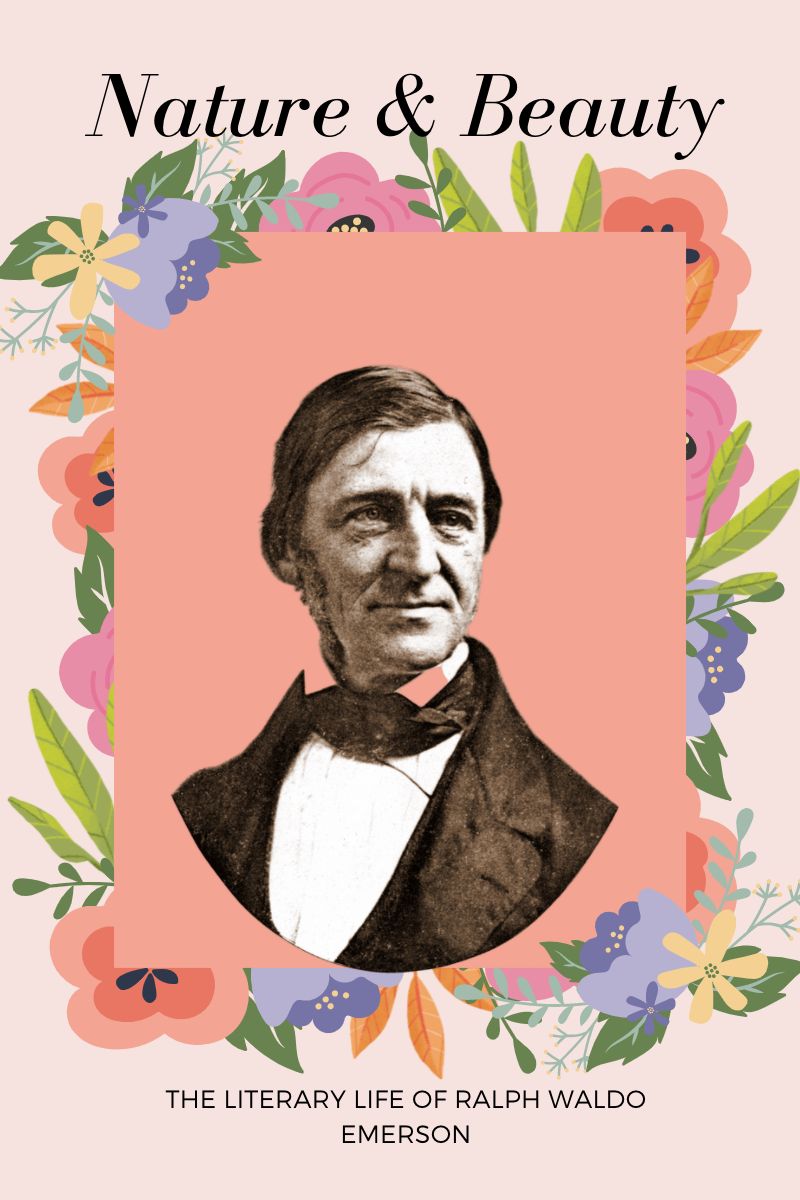- Home
-
Shop All
- Bible Verse & Christian
- Black & White Art Prints
- Book Lover Quotes
- Feminist Quotes
- Book Quote Mugs
- Fine Art Quote Prints
- Inspirational Wall Art
- Jane Austen Quotes Prints
- Jane Eyre & Bronte Art
- Love Poems & Quotes
- Minimalist Art Prints
- Nursery Decor Prints
- Other Options & Custom
- Poetry Quote Art
- Shakespeare Quotes Prints
- Travel Quote Art
- About
- Blog
- Track Order
- Contact Us

Nature & Beauty: The Literary Life of Ralph Waldo Emerson
A hundred and forty years after his death, Ralph Waldo Emerson retains his role as the father of Transcendentalism, one of several thinkers and writers of his time who created a whole new way of looking at the world. Despite the world being a very different place from Emerson’s day, his words still ring true and new readers continue to find inspiration and illumination in them.
But where did Emerson come from, and what was his background?
Read my short bio to find out more about America’s greatest philosopher-thinker.

Ralph Waldo Emerson, 1857
Emerson was born in 1803 in Boston, Massachusetts, and was one of five children. His father was a Unitarian minister. He died just before Emerson’s eight birthday, and he was raised by his mothers and several other female relatives.
At age 14, Emerson went to Harvard. He paid his tuition by working as a messenger for the university’s president and as a waiter. As is custom there, Emerson served as “Class Poet”. He graduated at 1821, at eighteen years old. Afterwards, he worked as a teacher in a school for young women established by his brother William and lived alone in a cabin in Roxbury, Massachusetts, to write and study nature.
At age 26, Emerson married his first wife, Ellen. When they married, Ellen was already ill with tuberculosis and they moved to Boston shortly after so that Emerson’s mother could care for her. She died two years later. In the course of this few short years, Emerson also lost two of his brothers. It was a time of turbulent grief and a crisis of faith for him.

Harvard Divinity School
Having graduated fro Harvard Divinity School in 1824, Emerson was ordained as a minster at Boston’s Second Church in 1832. His views began to differ from that of the church officials regarding some of the administration and practices. He resigned several months later, stating "this mode of commemorating Christ is not suitable to me”. He was no longer confined by an institution or religious tradition, although he would remain deeply religious all his life. In later years, he was invited to address Harvard Divinity School in a lecture entitled ‘Divinity School Address’. His statements on Jesus and Biblical miracles shocked the establishment and he was not invited back for another thirty years.

Emerson's house in Concord
At age 30, Emerson visited Europe for the first time. He traveled widely, and met many writers who would influence him greatly, such as William Wordsworth and Thomas Carlyle. In the fall of 1833, he returned back home to the States and began what would be a lifetime of lecturing. The first, on November 3rd 1833, was entitled ‘The Uses of Natural History.” He would go on to give over 1,500 lectures in his lifetime, by 1850 nearly 80 lectures a year, travelling all over the United States to deliver them. This would bring him the majority of his income, later enabling him to buy a small acreage of land and water by Walden pond.
At age 32, he married his second wife, Lydia Jackson, and they moved to the house he had bought the year earlier in Concord, Massachusetts. They would have four children together.
At age 33, Emerson along with Frederic Henry Ledge, George Putnam and George Ripley, held the first meeting of the Transcendental Club. Women were also later invited to attend. It was a group for intellectuals who struggled to fit into conventional circles. They shared the belief that the mind was formed by something more than just experience. They also prized personal autonomy, which included fighting for the rights of others, such as the Abolitionist movement.
At age 33, he published his first essay, “Nature”. The next year, he delivered a speech at the Phi Beta Kappa Society at Cambridge. This proved so popular, he was encouraged by his friends to publish it. It was a success and the 500-run of copies sold out straight away. At this time, he also met his life-long friend, Henry David Thoreau. This friendship would impact both of their lives and literary careers immeasurably. Thoreau was fifteen years younger than Emerson, the older man had a huge impact on Thoreau’s literary career.
In 1841, Emerson published a collection of essays, including “On Self-Reliance”, an essay which would bring him widespread fame and acclaim. A second collection of essays would be published several years later.
In 1848, he would tour the United Kingdom and witnessed the revolution in Paris. This experience would impact him strongly. His experiences of this time would later be recorded in his 1856 book “English Traits”. At this time he also publicly spoke out against the Fugitive Slave Act, saying it was “a filthy enactment was made in the nineteenth century by people who could read and write. I will not obey it.” Initially reticent to lecture on this subject, after the Civil War broke out he began to speak publicly on the matter more and more.
In 1862, he gave a lecture at the Smithsonian and visited Lincoln at the White House. Previously sceptical of Lincoln’s achievements, he soon warmed to him in person. He would later speak at Lincoln’s memorial service held in Concord.

Emerson's grave, photo from mygenealogyhound.com
In his later years, Emerson began to suffer from memory loss and a form of aphasia. He kept up lecturing to small groups until it no longer became feasible for him. He died in 1882, after a brief bought of pneumonia. He was buried at Author’s Ridge in Sleepy Hollow Cemetery, along with Henry David Thoreau and Louisa May Alcott.
There is no doubt that Emerson is the father of modern philosophy, an immeasurable influence on how we think about life, religion and man’s relationship with the natural world. It was put best by Theodore Parker, minister and fellow Transcendentalist, who said: "the brilliant genius of Emerson rose in the winter nights, and hung over Boston, drawing the eyes of ingenuous young people to look up to that great new star, a beauty and a mystery, which charmed for the moment, while it gave also perennial inspiration, as it led them forward along new paths, and towards new hopes.”
Read more : Ralph Waldo Emerson’s works at Project Gutenberg
The Mind on Fire by Robert D. Richardson Jr.
Visit: Author’s Ridge at Sleepy Hollow Cemetery.
Emerson’s family home in Concord, Massachusetts
Some of my favourite Ralph Waldo Emerson quotes...


"Dare to live the life you have dreamed for yourself. Go forward and make your dreams come true."

“Life is a journey, not a destination.”


Quick links
Search
FAQ
Privacy policy
Shipping Policies
Terms of service
OUR MISSION
At BookQuoteDecor.com, we’re passionate about transforming spaces with the magic of words. We create premium, literature-inspired decorations that not only beautify your home but also celebrate the timeless elegance of written language. Our mission is to bring the wonder of books into your daily life with every carefully selected quote.

Leave a comment: